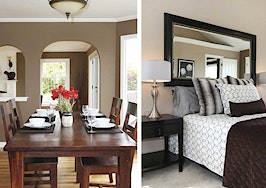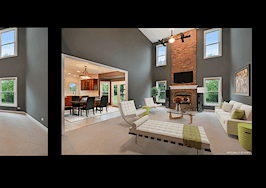- Staging a home "greatly reduces" the amount of time a home stays on a market, according to seller's agents.
- Buyer's agents concur that home staging has an effect on their clients' decision and how much they're willing to spend.
Inventory is low, which means most listings are selling faster than ever. But there are still some outliers — homes that, for whatever reason, can’t attract a serious buyer. According to The National Association of Realtors (NAR), the tipping point may come from a splash of paint and some carefully placed furniture; these additions can make any house feel like the perfect home.
In NAR’s 2017 Profile of Home Staging, 39 percent of seller’s agents said staging a home “greatly” decreases the amount of time a home stays on the market, and 77 percent of buyer’s agents said a staged listing makes it easier for buyers “to visualize the property as their future home.”

“Realtors know how important it is for buyers to be able to picture themselves living in a home and, according to NAR’s most recent report, staging a home makes that process much easier for potential buyers,” said NAR President William E. Brown in a statement.
Only 38 percent of respondents stage all their listings, and 14 percent will turn to staging if the home isn’t garnering offers. Thirty-seven percent of seller’s agents only ask that clients make minor changes such as:
- Decluttering (93 percent)
- Entire home cleaning (89 percent)
- Carpet cleaning (81 percent)
- Remove pets during showings (80 percent)
- Minor repairs (75 percent)
- Depersonalize home (72 percent)
The most commonly staged spaces are the living room (83 percent), kitchen (76 percent), master bedroom (69 percent) and the dining room (66 percent). Twenty-nine percent of respondents said these changes increased the home’s final selling price by 1 to 5 percent, and 21 percent said the home’s final selling price increased by 6 to 10 percent.

Seller’s agents’ instincts on which rooms to prioritize for staging seem to be on point, as most buyer’s agents said the living room, master bedroom and kitchen were “very important” rooms for their buyers. The only time seller’s agents missed the mark was with dining rooms — most buyers said that room was only “somewhat important” when deciding on a home.
Ninety-eight percent of respondents who were buyer’s agents said home staging has some effect on their client’s decision to make an offer, and 31 percent said buyers are willing to spend 1 to 5 percent more on a home that was staged.
“While all real estate is local, and many factors play into what a home is worth and how much buyers are willing to pay for it, staging can be the extra step sellers take to help sell their home more quickly and for a higher dollar value,” Brown noted.
About the study
In March 2017, NAR invited a random sample of 53,760 active Realtor members to fill out an online survey. A total of 1,894 useable responses were received for an overall response rate of 3.5 percent. At the 95 percent confidence level the margin of error is plus-or-minus 2.25 percent.






